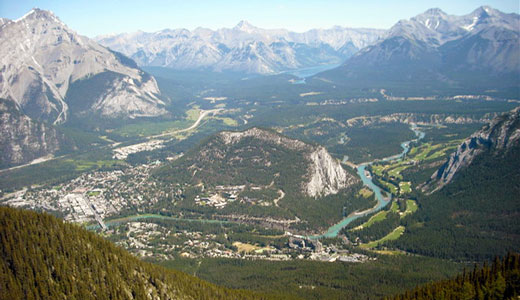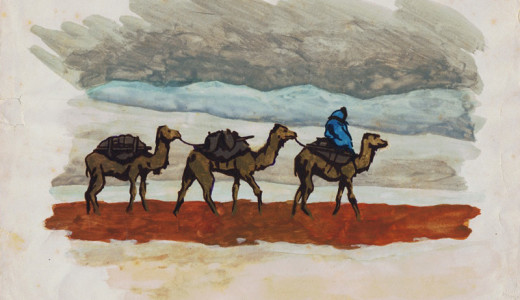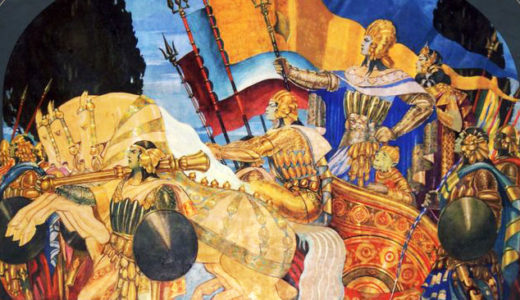Beyond the Ulmas: The Need for a Social History of Genocide in Occupied Poland
Commemorations hold a special place in national memory; historians have an obligation to protect the emerging social history from being eclipsed. Tom Frydel explains.

Farewell and STO LAT.
From all of us to all of you.

Poland in the Rockies? Yes, and from there to wherever English-speaking Poles live, via Cosmopolitan Review.
Read more...
When the Soviets deported Polish citizens from their zone of occupied Poland, the Poles began a journey that would cover several continents and oceans. Among the most amazing is the saga of the children’s odyssey.
Read more...
The largest single collection of Polish art is not in Poland, but in India. A special exhibit brings it home, at least for a visit, attracting thousands of visitors to a visual feast.
Read more...Germany’s genocidal colonialism in occupied Poland was the “Heart of Darkness” in its relentless exploitation and brutality. The Dark Heart of Hitler’s Europe provides essential context to understanding the individual atrocities of that period.
Book reviews are usually assigned to reviewers who know something about the subject at hand. Film reviews? Not so much. So CR takes a look at The Zookeeper’s Wife… and also some of the reviews.
When two Polish Canadians visit their grandparents’ childhood homeland in Africa they meet others on the same quest. “We immediately celebrate!” writes Amanda Chalupa. We ‘get’ each other.”
When was the last time you visited a citta ideale? No, not in Italy. Zamość, in Poland. Designed by Bernardo Morando, according to the vision of Jan Zamoyski, Chancellor of Poland, a nobleman and a magnate of great wealth.
Commemorations hold a special place in national memory; historians have an obligation to protect the emerging social history from being eclipsed. Tom Frydel explains.
“Tell your people that they have a friend in the White House.” But the genocide continued, and in the end the friend gave Karski’s country to Stalin.
This is a war story that unites the fate of soldiers and civilians. Thank you, Norman Davies, for gathering the memoirs, the photographs, and the historian’s details, and telling the story with such élan. Now where’s the young historian who will break new ground and write a scholarly work on this neglected subject?
From Norway to Africa, from Russia to the Atlantic, in the air and on the sea, the Polish forces were there for their allies. Justine Jablonska pays tribute to the bravest and most loyal men and women of WWII.
Ethnic and religious diversity are now hot topics, something never tried before. Really? The Commonwealth warrants new attention. Thaddeus Gromada provides an introduction.
In a 1988 newscast, Stephanie Kraft heard the hejnał played from the tower of the Mariacki Church and learned that Poles had been doing so all through the communist era. Intrigued by these determined and stubborn people, she chose Poland as her destination for a journalist junket. She has returned every year since.
All the elements of seasonal hedonism are here – Sea, Sun and Sex – but so are cruelty, indifference and memory, all playing havoc with people’s dreams and hearts. It’s love and death in Tel Aviv.
“Wow, we did that?!” Yes, dear children, listen to Jill Godmilow and learn what your brave and smart elders once did, nothing less than “the greatest revolution in the world.”
Mieczysław Weinberg’s opera, The Passenger, is not only a complicated work of art, but a complicated work of historical trauma. Magda Romanska reviews the work with a brilliant survey that covers the opera, the history, the novel by Zofia Posmysz, the film by Andrzej Munk, and the responses to the production.
They received gifts of dates, nuts, roasted peas with raisins, and juicy pomegranates; visited museums, mosques and bazaars; and were always greeted with kindness. All this in what has often been called the most beautiful city in the world.
It’s a black-and-white film about a Polish Catholic nun that America didn’t ridicule but fell in love with. Agnieszka Niezgoda asks three members of the Academy, “Why?”
The world’s largest crocodiles cooled off in nearby water, and hippos and baboons helped themselves to lunch. But it was entertaining. And Irene Tomaszewski was there.
The Neon signs of the communist era were works of art, even though the product was never in stock. Eric Bednarski celebrates the art and the artists.
Talented, gutsy and successful – and each one with a story that rates a movie of its own. This is a book you won’t be able to put down.
The memorial Centre in the German city of Halle Saale will unveil a monument to Krystyna Wituska, a young Polish prisoner executed on June 26, 1944, and two German authors will launch their book, Zelle Nr. 18: Eine Geschichte von Mut und Freundschaft (Cell No. 18: a History of bravery and friendship) to mark the 70th anniversary of her death.
“Masterpieces of Polish Cinema,” organized and restored by Martin Scorsese’s Film Foundation and curated by the great filmmaker himself, is the largest collection of classical Polish cinema to date.
Don Fredericksen reviews Krzysztof Zanussi’s brilliant film, Camouflage.
With access to hitherto unused archives, historian Alexandra Richie brings little-known facts and a sobering description of the barbaric destruction of the people and the city of Warsaw.
Meet the “Polanders” of California who celebrated their 150th anniversary.
Attention all foodies: Polish food is fresh, lively and delicious. Reviewer Pierre Gratton dismisses stale opinions. A French conspiracy, he suspects, ably put down by Anne Applebaum and Danielle Crittenden.
Getting the vote is all well and good. But what if women want more than that? Beth Holmgren looks at Poland’s interwar cabaret culture.
Michał Kasprzak’s brilliant review cuts to the essence of The Auschwitz Volunteer.
Where is Szymborska going?
Benjamin Paloff suggests that she is, in fact, staying; she has a lasting place in our literature, her poems have that special quality that enables them to unfold into variations of themselves.
The regime was harsh, the system absurd but rules made up in Moscow were no match for the individualistic Poles. Magda Romanska’s delightful piece shows us how it was done. Elegantly, of course.
Patrice Dabrowski reviews Bernadette McDonald’s gripping and heart-wrenching chronicle of the greatest Himalayan climbers of the 20th century. Winner of the American Alpine Association’s Literary Award, the Grand Prize at the Banff Mountain Book Festival, and Britain’s Boardman Tasker Prize.
Helena Modjeska, a great 19th century Polish actress who came to the US at age 30, learned enough English in six months to play Ophelia, except for the mad scene which was too difficult. So she played that in Polish and wowed them. Aren’t all madwomen incoherent anyway? Margaret Araneo reviews Beth Holmgren’s great book about the very talented, and very independent, Madame Modjeska.
It’s easy to say which nation has the fastest trains (France) or the largest number of prime ministers who’ve probably been eaten by sharks (Australia), but it’s impossible to know which country has the best writers, let alone the best poets. Even so, if cash money were on the line, you’d find few critics willing to bet against Poland.
– David Orr,
The New York Times,
July 29, 2007
Isabelle Sokolnicka concurs, and thinks the language may have something to do with it.
A 16th century mayor of Warsaw was a Scottish immigrant. In the 1940s, and again this century, Scotland has welcomed Poles. Time to renew this “auld acquaintance… for auld lang syne.”
For centuries, the biodiversity of the great forest of Poland’s eastern borderlands was the natural habitat for a diversity of cultures.
Book reviews are usually assigned to reviewers who know something about the subject at hand. Film reviews? Not so much. So CR takes a look at The Zookeeper’s Wife… and also some of the reviews.
Germany’s genocidal colonialism in occupied Poland was the “Heart of Darkness” in its relentless exploitation and brutality. The Dark Heart of Hitler’s Europe provides essential context to understanding the individual atrocities of that period.
Eva Stachniak’s book offers a rare glimpse into the turbulent life and times of Bronia Nijinska and the waning days of the Russian empire. Nijinska’s talent was overshadowed by her brother but as he said, “Art is all that matters… Everything else is distraction.”
CR takes this opportunity to publish a letter written by Eli Rubenstein, the Canadian Director of the March of the Living and an award-winning educator, to the JTA (Jewish Telegraph Agency) concerning its Dec. 11th article about Polish rescue efforts of Jews during WWII, followed by our own comments.
In 1938, a little girl, Alina Bandrowska, saw her father arrested by the NKVD, the Soviet secret police. He never returned.
Hela can be exasperating. Her views on gender relations outdated and her national prejudices problematic, she says inappropriate things at the dinner table. But she is the aging relative you love anyway, for her frankness and spirit.
The unflappable, ever courteous Jonathan Lipman was living a life filled with friendship and laughter. Suddenly his daughter asked her mother not to speak Polish in public. You never know where a populist’s hatred will strike next.
Back in 1999, Lipman sailed his little ship in the (mostly) smooth Polish sea. Back in London, they happily welcomed the EU-Polish immigrants. But the once smooth English Sea is getting increasingly turbulent. Not that the Polish sea has remained calm.
Welcome to Springtime in Africa. Yes, there are seasons there, not so pronounced perhaps, but the blossoms on their jacaranda trees are as welcome as are crocuses in northern climates. Commentary, books, films, and a new podcast.
Martha Hall Kelly’s novel is based on the true story of Caroline Ferriday, a New York socialite who brings Polish Ravensbruck survivors to America for treatment. And locates the criminal Dr. Herta Oberheuser.
A documentary about an engineer? Take a look at Ralph Modjeski’s bridges. They are breathtakingly beautiful and they were built to last. Basia and Leonard Myszynski’s film is a must.
Tune in to the lively new podcast for a weekly series of great stories and interviews on topics ranging from serious to funny, quirky to obscure with Toronto’s Małgorzata Bonikowska and Tomek Kniat.
In Lithuania to study the once culturally diverse now vanished communities of the region, Lynn Lubamersky found a BBC TV crew there too, filming “War and Peace.” That’s enough to set a historian thinking about imperial Russia then, imperial Putin now, the communities that don’t want to vanish… and the BBC’s Downton Abbey-style production.